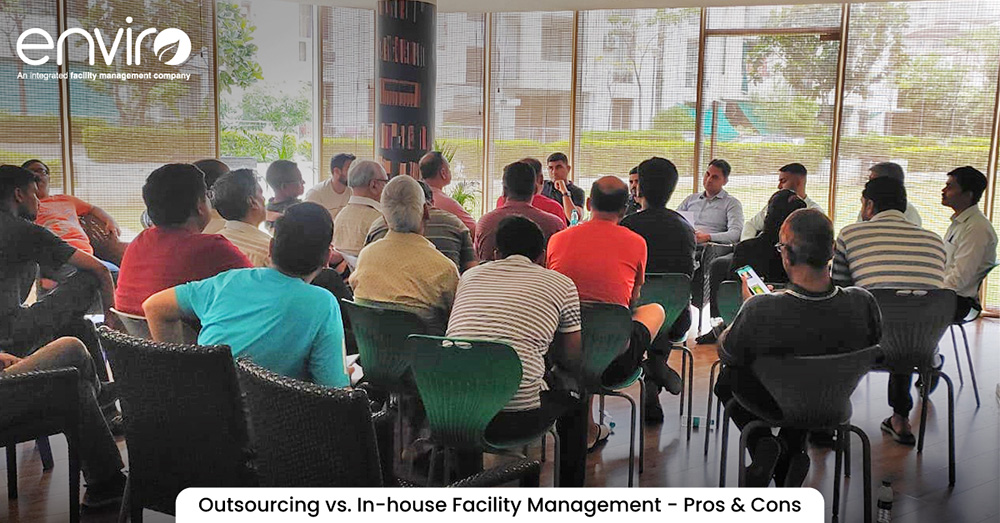Effective Facility Management plays a crucial role in the smooth operations of any business, ensuring that the physical infrastructure supports the organization’s goals and objectives. It encompasses a diverse array of services, ranging from building maintenance to janitorial services, security and more. When it comes to running and maintaining the buildings, organizations have two options – outsource end-to-end facility management tasks or handle them in-house. The decision between the two requires careful consideration, planning and evaluation of business goals and the competitive landscape. Let’s take a more in-depth look at their pros and cons.
Outsourcing Facility Management
It involves hiring external service providers to handle various aspects of the organization’s facility needs.
Pros
1. Cost-Effective: Outsourcing leads to cost savings in many ways. This eliminates the need for hiring and training full-time staff and managing additional overhead costs.
2. Expertise and Specialization: Facility Management companies are experts in their field and possess deep knowledge of industry best practices and the latest technologies. Outsourcing facility management helps organizations stay up-to-date and operate at peak efficiency.
3. Focus on Core Activities: By outsourcing facilities management, organizations can redirect their resources and efforts towards their core business functions which can directly contribute to increased productivity and profitability.
4. Flexibility: Outsourcing facility management tasks provide organizations with the flexibility to scale up or down the services based on the current needs. This agility can be beneficial for businesses with fluctuating demands, seasonal operations or those undergoing rapid growth or contraction.
5. Compliance: Statutory compliance, which can be big hassle is taken care by the IFMS. It also includes the health & insurance part.
Cons
1. Loss of Direct Control: One of the major drawbacks of outsourcing facility management companies is the potential loss of direct control over day-to-day facility management operations. This can be a concern when there are some specific preferences or issues that need immediate attention.
2. Communication Challenges: Outsourcing facilities management may be challenging as it becomes difficult to align the goals and priorities of the third party with those of the business. Misunderstandings or delay in communication may lead to dissatisfaction or service disruptions.
3. Risk of Vendor Dependence: Relying on an external facility management service provider can lead to service disruptions in case of vendor facing some issues or changes in their management.
4. Confidentiality Concerns: Sharing sensitive data and information with the third-party service provider can be a threat to data security and confidentiality.
In-house Facility Management
It involves the recruitment and management of a dedicated team to handle all the facility-related tasks.
Pros
1. Direct Oversight and Control: With an in-house facility management team, businesses have direct control over all the aspects of facility operations. This allows for immediate adjustments, prioritization of tasks and a hands-on approach to problem-solving. This may involve day-to-day participation.
2. Company Culture: In-house teams have a better grasp of the company’s culture, values and objectives. This leads to a more personalized approach to facility management ensuring tailored solutions to meet the unique requirements of the business.
3. Job Loyalty: In-house teams have a stronger sense of loyalty and dedication towards their profession, leading to a higher level of commitment to work and service quality.
Cons
1. High Cost: Sustaining an in-house facility management team can be financially burdensome due to costs associated with hiring, training, benefits and salaries. Additionally, businesses may face higher procurement costs for services as compared to outsourcing.
2. Limited Expertise: An in-house facility management team may possess a deep understanding of the company’s operations but may not have the same level of expertise that a dedicated facility management company may provide. Staying up-to-date with industry trends and best practices may also be more challenging. Multi-tasking is not accepted by the technician.
3. Administrative Burden: Managing an in-house facility management team can be administratively burdensome. Overseeing staffing, training, compliance and day-to-day operations can divert resources away from core business activities.
4. Lack of Scalability: In-house teams may encounter challenges in adapting to fluctuations in the size and scope of facility management needs. Hiring or laying off the manpower can be a costly and challenging task.
Conclusion
The choice between outsourcing and in-house facility management is not one size fits all approach and hinges on the organization’s specific needs and preferences. With a careful consideration of various factors such as budget constraints, expertise and level of control, organizations can make an informed choice that aligns with their long-term success. Many organizations find a hybrid approach, combining both outsourcing and in-house facility management. For instance, they may outsource certain services while retain in-house control over critical functions. It is imperative to meticulously assess specific requirements and consider the pros and cons of each approach before making a final decision.





 WhatsApp Business +91 88000 09776
WhatsApp Business +91 88000 09776
 CSC
CSC  WhatsApp Business
WhatsApp Business 